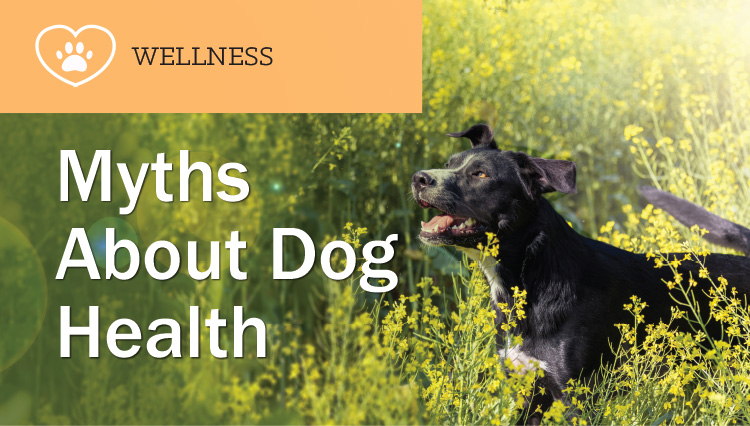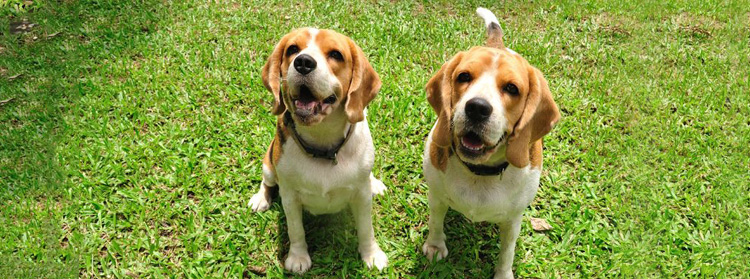
Uncover the Truth Behind Common Dog Health Myths
Most dog owners have questions about their dogís health. It can be difficult to discern normal from abnormal, myth from truth, and fact from fiction. In this article we explore the top ten most common myths about dog health to give dog owners the power of knowledge.
Myth 1: A Warm, Dry Nose Means my Dog is Sick
The temperature or moistness of your dogís nose is not always the best indicator of good health. It is actually common for dogs to have a dry nose when they first wake up. How should you know that your dog is sick? Here are some signs that you should take your dog to the vet immediately:
- Difficulty Breathing
- Lethargy
- Poor Appetite for more than two days
- Vomiting/ diarrhea for more than one day

Myth 2: Dogs Heal Themselves by Licking Their Wounds
This myth has some truth within it. A small amount of licking can be helpful in cleaning out small scrapes and minor scratches. However, excessive licking or chewing can impede the healing process. This is behavior is especially harmful in the case of surgical incisions, which is why your vet will often suggest an E-collar (cone) for your dog to wear. It isnít intended to make your dog look funny, it is meant to stop your dog from infecting the incision and creating medical complications.
Myth 3: Brushing my Dog's Teeth is Unnecessary
Brushing your dogís teeth is an absolutely critical part of caring for your dog. On a superficial level, proper oral hygiene wards off periodontitis, gum disease and makes your dogís mouth smell clean. On a deeper level, daily tooth brushing prevents plaque from turning into tartar, which causes gum inflammation. This inflammation allows bacteria to flourish, eventually leading to bacterial infections that can spread through the bloodstream into the vital organs. Brushing your dogís teeth daily has a huge impact on your dogís long term health.
Myth 4: Female Dogs Should Have a Least One Litter Before They Are Spayed
There is no medical evidence supporting this myth. In fact, it is generally easier on your dog to spay them at an earlier age. What also proves true is the fact that thousands of animals are euthanized in shelters every year due to overpopulation. Adding to the pet population ultimately makes this problem worse.
Myth 5: Dogs Eat Grass to Make Themselves Vomit
If your dog is eating grass, it likely isnít because he is sick. In fact, research suggests that animals may eat grass just because they like the way it tastes! This being said, if you notice that your dog is eating a large amount of grass on a daily basis, you may want to consult your vet about this abnormal behavior.

Myth 6: Dogs Have Cleaner Mouths Than Humans
Dogs do not have cleaner mouths than humans. Although, this comparison is difficult to make because they are dirty in ways that are specific to our respective species. The germs in your dogís mouth are specific to dogs just as the germs in humanís mouths are specific to humans. As long as you are keeping your dog up-to-date on vaccines and dewormed regularly, you need not worry too much about germs being passed along.
Myth 7: If I Have a Backyard I Don't Need to Take My Dog for a Walk.
Walking your dog is an important daily activity, even if you have a backyard. Walks are important not only for exercise but for mental stimulation. Allowing your dog to explore environments other than familiar territory provides stress relief and is good way of bonding with your dog.
Myth 8: Garlic Mixed in With My Dogís Food Will Get Rid of Worms
Garlic may be delicious for people, but it is toxic for dogs. Also, garlic will not get rid of worms. Garlic and onions contain a compound that can severely damage your dogís red blood cells. In severe cases of ingestion of these foods, dogs might need a blood transfusion. The safest and most effective way to rid your dog of worms is by using a dewormer regularly.
Myth 9: Dogs Don't Sweat
Dogs do have sweat glands but these sweat glands are mainly located in your dogs paws. Dogs will rarely sweat to release heat, instead they pant to release heat. So while dogs can in fact sweat, sweating through the paws is actually a sign of overheating and should be monitored closely to prevent heat stroke.
Myth 10: Dogs That are Mostly Indoors do not Need Heartworm Prevention nor Tests
Indoor pets can contract heartworm disease. It is important to have your dog tested yearly for heartworm and to deworm them on a regular basis to keep them parasite free in general.

